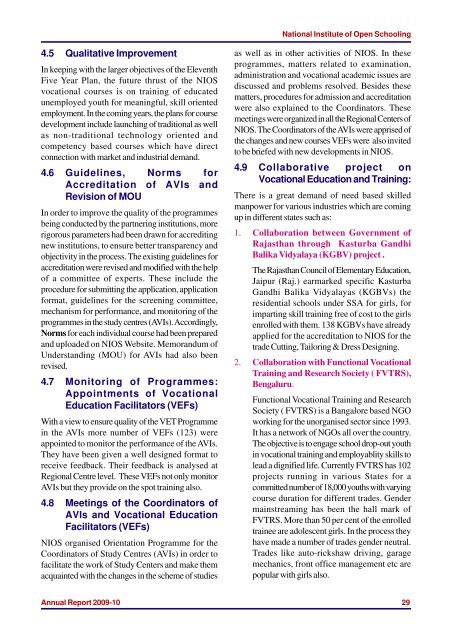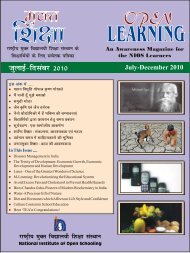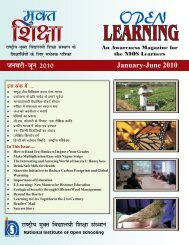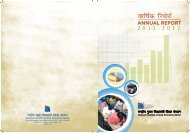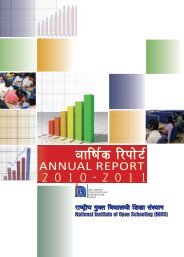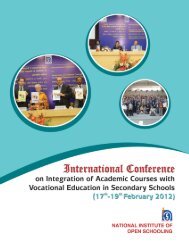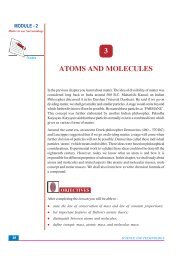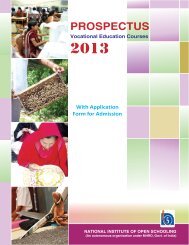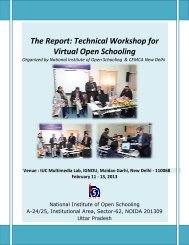2009-10 (16.6 MB) - The National Institute of Open Schooling
2009-10 (16.6 MB) - The National Institute of Open Schooling
2009-10 (16.6 MB) - The National Institute of Open Schooling
Create successful ePaper yourself
Turn your PDF publications into a flip-book with our unique Google optimized e-Paper software.
<strong>National</strong> <strong>Institute</strong> <strong>of</strong> <strong>Open</strong> <strong>Schooling</strong><br />
4.5 Qualitative Improvement<br />
In keeping with the larger objectives <strong>of</strong> the Eleventh<br />
Five Year Plan, the future thrust <strong>of</strong> the NIOS<br />
vocational courses is on training <strong>of</strong> educated<br />
unemployed youth for meaningful, skill oriented<br />
employment. In the coming years, the plans for course<br />
development include launching <strong>of</strong> traditional as well<br />
as non-traditional technology oriented and<br />
competency based courses which have direct<br />
connection with market and industrial demand.<br />
4.6 Guidelines, Norms for<br />
Accreditation <strong>of</strong> AVIs and<br />
Revision <strong>of</strong> MOU<br />
In order to improve the quality <strong>of</strong> the programmes<br />
being conducted by the partnering institutions, more<br />
rigorous parameters had been drawn for accrediting<br />
new institutions, to ensure better transparency and<br />
objectivity in the process. <strong>The</strong> existing guidelines for<br />
accreditation were revised and modified with the help<br />
<strong>of</strong> a committee <strong>of</strong> experts. <strong>The</strong>se include the<br />
procedure for submitting the application, application<br />
format, guidelines for the screening committee,<br />
mechanism for performance, and monitoring <strong>of</strong> the<br />
programmes in the study centres (AVIs). Accordingly,<br />
Norms for each individual course had been prepared<br />
and uploaded on NIOS Website. Memorandum <strong>of</strong><br />
Understanding (MOU) for AVIs had also been<br />
revised.<br />
4.7 Monitoring <strong>of</strong> Programmes:<br />
Appointments <strong>of</strong> Vocational<br />
Education Facilitators (VEFs)<br />
With a view to ensure quality <strong>of</strong> the VET Programme<br />
in the AVIs more number <strong>of</strong> VEFs (123) were<br />
appointed to monitor the performance <strong>of</strong> the AVIs.<br />
<strong>The</strong>y have been given a well designed format to<br />
receive feedback. <strong>The</strong>ir feedback is analysed at<br />
Regional Centre level. <strong>The</strong>se VEFs not only monitor<br />
AVIs but they provide on the spot training also.<br />
4.8 Meetings <strong>of</strong> the Coordinators <strong>of</strong><br />
AVIs and Vocational Education<br />
Facilitators (VEFs)<br />
NIOS organised Orientation Programme for the<br />
Coordinators <strong>of</strong> Study Centres (AVIs) in order to<br />
facilitate the work <strong>of</strong> Study Centers and make them<br />
acquainted with the changes in the scheme <strong>of</strong> studies<br />
as well as in other activities <strong>of</strong> NIOS. In these<br />
programmes, matters related to examination,<br />
administration and vocational academic issues are<br />
discussed and problems resolved. Besides these<br />
matters, procedures for admission and accreditation<br />
were also explained to the Coordinators. <strong>The</strong>se<br />
meetings were organized in all the Regional Centers <strong>of</strong><br />
NIOS. <strong>The</strong> Coordinators <strong>of</strong> the AVIs were apprised <strong>of</strong><br />
the changes and new courses VEFs were also invited<br />
to be briefed with new developments in NIOS.<br />
4.9 Collaborative project on<br />
Vocational Education and Training:<br />
<strong>The</strong>re is a great demand <strong>of</strong> need based skilled<br />
manpower for various industries which are coming<br />
up in different states such as:<br />
1. Collaboration between Government <strong>of</strong><br />
Rajasthan through Kasturba Gandhi<br />
Balika Vidyalaya (KGBV) project .<br />
<strong>The</strong> Rajasthan Council <strong>of</strong> Elementary Education,<br />
Jaipur (Raj.) earmarked specific Kasturba<br />
Gandhi Balika Vidyalayas (KGBVs) the<br />
residential schools under SSA for girls, for<br />
imparting skill training free <strong>of</strong> cost to the girls<br />
enrolled with them. 138 KGBVs have already<br />
applied for the accreditation to NIOS for the<br />
trade Cutting, Tailoring & Dress Designing.<br />
2. Collaboration with Functional Vocational<br />
Training and Research Society ( FVTRS),<br />
Bengaluru.<br />
Functional Vocational Training and Research<br />
Society ( FVTRS) is a Bangalore based NGO<br />
working for the unorganised sector since 1993.<br />
It has a network <strong>of</strong> NGOs all over the country.<br />
<strong>The</strong> objective is to engage school drop-out youth<br />
in vocational training and employablity skills to<br />
lead a dignified life. Currently FVTRS has <strong>10</strong>2<br />
projects running in various States for a<br />
committed number <strong>of</strong> 18,000 youths with varying<br />
course duration for different trades. Gender<br />
mainstreaming has been the hall mark <strong>of</strong><br />
FVTRS. More than 50 per cent <strong>of</strong> the enrolled<br />
trainee are adolescent girls. In the process they<br />
have made a number <strong>of</strong> trades gender neutral.<br />
Trades like auto-rickshaw driving, garage<br />
mechanics, front <strong>of</strong>fice management etc are<br />
popular with girls also.<br />
Annual Report <strong>2009</strong>-<strong>10</strong> 29


